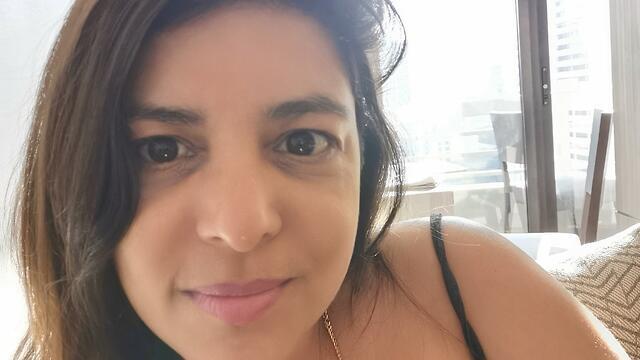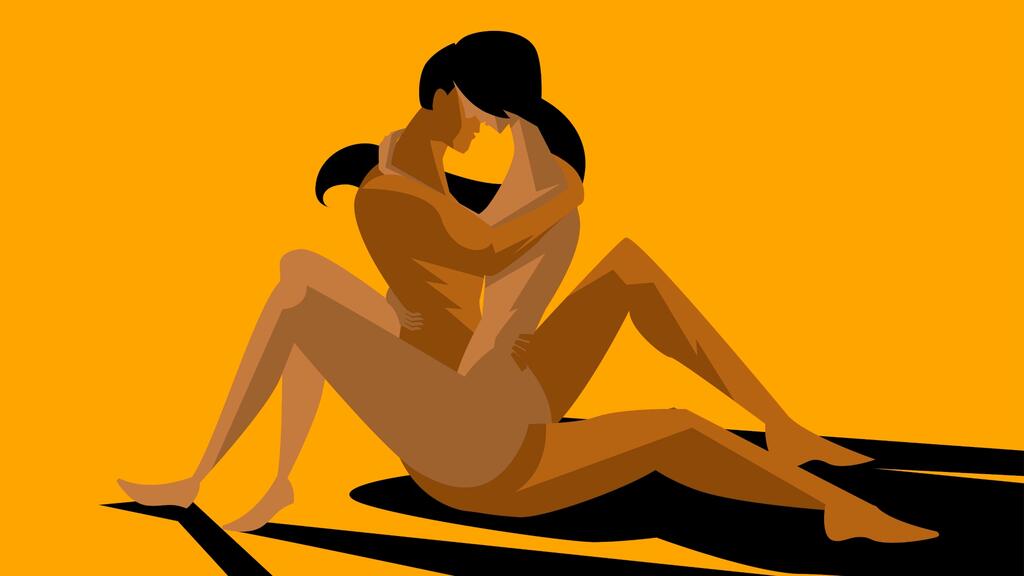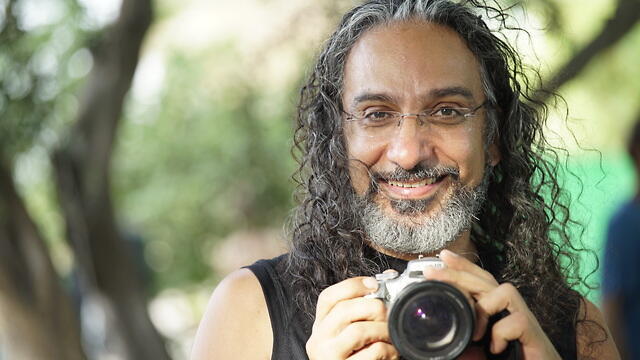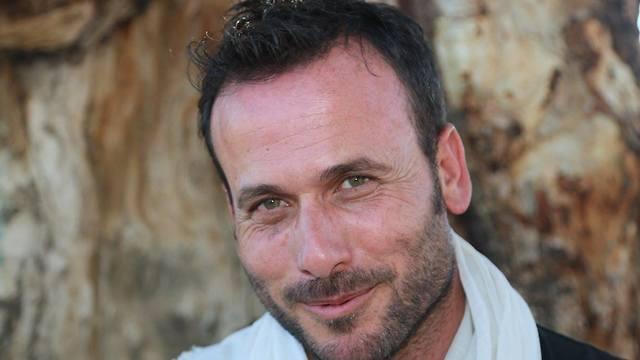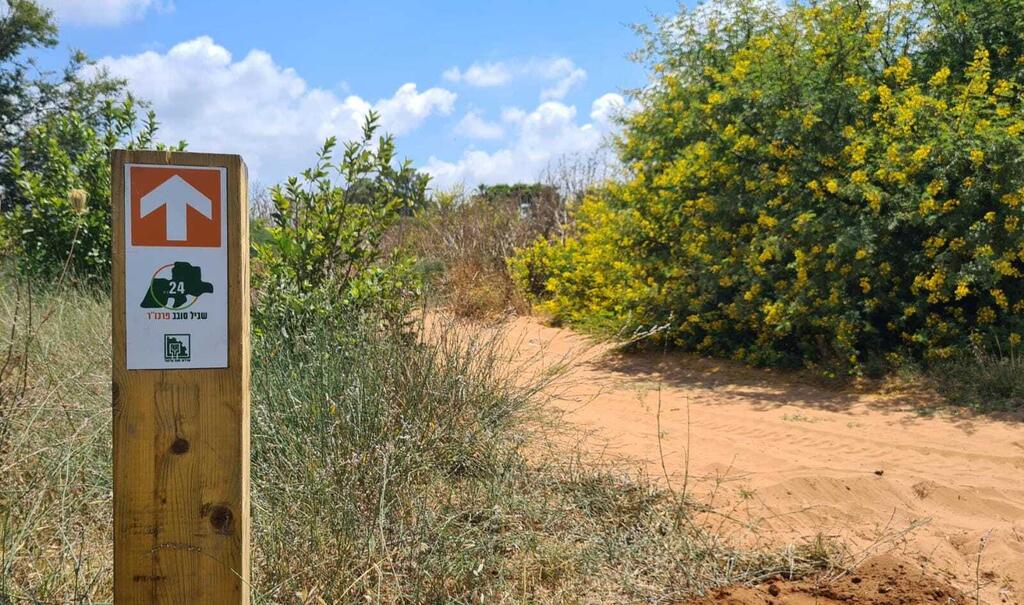If you ask lawyer-turned-Tantra-healer, Shani Bar, every day in the small northern town of Pardes Hanna-Karkur is a party. With her eyes shining, she exclaims that "Pardes Hanna's a 365-day-a-year festival."
One day it's a cuddle party, the next it's a polyamory party, and on the other days of the month, there are circles of sound, liquid contact workshops, ecstatic dancing to tribal music, cacao ceremonies, bonfires and no end of jam sessions featuring the country's top musicians."
Five years ago, Bar, 37, made a real change in her life. "My father died suddenly of a heart attack, aged just 60, and I began asking myself what life was all about." As part of her search, she quit her job and took off to India. On her return, she started going to festivals and conferences focusing on sexuality and Tantra. There, she first met Tantra healers from Pardes Hanna. "They had this aura of freedom about them. A lot of them weren't career-oriented, but rather would go off to sit by a river or watch the sunset."
She soon started a relationship with a healer she met, Amir, who encouraged her to delve further into Tantra. Alongside her former instructor, Ram Avner, she now advises men experiencing premature ejaculation.
Settling in Pardes Hanna was by no means random. The region, home to 43,000 residents, has become a New Age paradise. You'll find Tantra healers like Bar and her friends, circles of sound instructors, fans of Israel's version of the iconic "Burning Man Festival" known as "Midburn," and a broad range of hippies who've come together to form one big festival of community-based free and open sexuality.
One must ask why. Or more precisely, what is that that's made Pardes Hanna-Karkur the country's capital of alternative sexuality?
Pardes Hanna's 'Sacred Sexuality'
"The appeal of Pardes Hanna is its simplicity," says 51-year-old Sujay Shemesh, father of three, who with his wife, Moran Gottlieb, opened Israel's first Tantra school nine years ago. "It's not really a town, but then again, it's not remote. I think beauty attracts beauty – which means that people who live their lives connected to spirituality and meditation have come together to be with other like-minded people. We have a merging of spiritual communities as well as a core base, putting out a vibe making other people want to come too."
After spending years in India, including in Osho's famed ashram in Pune, Sujay returned to Israel and founded the "Desert-Ashram" - a Tantra workshop center based on Osho's meditation techniques - which has proved extremely popular.
Around 2007, a group of Desert-Ashram alumni moved to Pardes Hanna, but they weren't the first tribe to settle in the area. At the time, Pardes Hanna was already home to a community centered around the Rainbow Festival, sometimes defined as the incarnation of the Woodstock-generation hippies.
Sujay works coaching Sacred Sexuality, a doctrine based on wisdom of the East and views the creation of sexual spaces as a way to contribute to a person's development and views lust as a positive, therapeutic force. "The Sacred Sexuality scene in Pardes Hanna is made up of a number of interconnected communities." He includes Maarag, the Hebrew acronym for "Sex, Love, Sensitivity, Body", which is a community of Tantra instructors, ISTA (International School of Temple Arts) – an international organization for sexuality, consciousness and sexual therapy - and the Ishtar community which combines sexual studies and consciousness development with further body-soul systems.
"Pardes Hanna attracts people who want to be creative together, not just in the field of sexuality, but with the desire to sit together and flow together. This means that on an everyday basis, people in Pardes Hanna meet up with guitars around bonfires. I think the very high level of physical and emotional exposure between people has formed a deeper connection between them. The various groups living here are blending into one another."
Sujay claims that Pardes Hanna's New Age community has a vibrant nightlife, operating partly beneath the radar. It boasts haflas, love temples and workshops, as well as pubs and restaurants like in the big cities. Sharply contrasting environments exist side by side, suitable for people who want to move seamlessly between "ordinary" and alternative lifestyles.
How do the Pardes Hanna old-timers take to the Tantra people flocking here in recent years?
"Pardes Hanna veterans are traditional and religious and have been very welcoming to us hippies."
Sujay also mentions a further, more prosperous, demographic. "More and more people have been coming here from the center of the country - hi-tech and army people wanting to get out of the city and buy a house with a garden, bringing their own color. Pardes Hanna's welcomed them, but integration takes time. There's still parking space," he jokes.
What do you think the magical secret of Pardes Hanna is?
Pardes Hanna has a combination of ordinary and spiritual - that's the magic that makes people want to bring their lives here. At the supermarket, you can bump into someone you were at an ashram with and have a hug by the checkout. There's a certain tenderness that creates humanity."
A magnet for those in search of exploratory community
Maoz Yaakov, 44, is a leader within the sexuality community "Ishtar". He's a sexologist holding a masters's degree in clinical social work. "Pardes Hanna has become a spiritual-hippie center researching a lot of things, including sexuality."
He was inspired to further explore Sacred Sexuality by Ohad Pelle Ezrahi, founder of the Neviah Hebraic Academy of Spirit. "At Neviah, there was a course called 'Sacred Sexuality' where Ohad addressed the ancient Hebrew understanding of sexuality and ritual sexuality. At some stage, he wanted to delve further into the research of sexuality and started "touch-research" meetings in which I participated.
Yaakov recalls the pioneering feeling of 30 mad people - by nature curious and exploratory - who had no idea what they were getting into. These meetings took place, obviously, in Pardes Hanna.
"We started out a small bunch of crazy people and then gradually it became a magnet for exploratory community research. It's important to understand that it's not a community like in a kibbutz, based around a work ethic. This is a much gentler, more embracing community.
"All we knew was that we wanted to research. Unlike sleazy partner-swapping parties, we wanted to understand what makes sexuality sacred, what makes it holy. Ezrahi brought his knowledge. What we were doing was very daring."
Recalling the early days, he says: "Dealing with sexual energy is playing with gunpowder. The challenge is connecting sexuality to the heart. We worked on creating focused and connected sexuality, creating a marvelous celebration of hormones in the body, no less powerful than conciseness-enhancing substances."
"We loved working together. Each time, we'd research something different. We worked with the months of the year and days with strong energy. We were very focused and enjoyed what we were doing. It was very convenient that we all lived nearby and had very good neighborly relations. We felt that what we are doing was groundbreaking.
"If you ask me, sexuality is a lot more than sex. On a basic level, sexuality reflects the first part of our communication process. The ability to heal, trust, devote, express pain and our animistic sides, fear and shame - sexuality brings together these parts of our lives," he says.
"Compared to Europe, Israel is very chauvinistic on this front. Men don't feel they can connect to their feminine, gentle, accepting side. In Pardes Hanna, however, a positive developmental space has been created. Our generation holds this space and is teaching the young people who are coming here."
'Not everyone's invited'
Some people don't feel part of the scene, even finding it rather "all-the-same". Sharon, 27, and her partner Neri, 30, are part of the new generation arriving in the area in recent years. They regard themselves as "Burners" and live a polyamorous lifestyle. In addition to being part of the "Midburn" community, they're involved in both ISTA and Ishtar. "On the one hand, there are a lot of types of hippies here, singing circles and performances, but on the other hand, it's all much the same," says Sharon. Although a lot of people in the area live polyamorously and are in open relationships, she doesn't feel a sense of community among polyamorists.
How would you define your polyamory?
For me, polyamory is the freedom to choose. Neri and I live in hierarchic polyamory. We're engaged to be married and we know that we'll build our family together, but we want to raise our children with more partners and more children."
In contrast to the rest of the people we interviewed, this couple didn't feel a sense of community in Pardes Hanna. "Yes, there are a lot of events, but not everyone living in Pardes Hanna is invited to them. You generally hear about them by word of mouth, or if you were on some course or workshop which ended up with some kind of event." In other words, she says that if you're new and not well enough connected, chances are you won't be part of these events.
Moreover, this migration to Pardes Hanna has inevitably brought on an increase in property prices, making it less accessible for young couples.
What about the old-timers?
Unlike Sujay's description of them being very welcoming, Sharon says that they're rather conservative and are not at all happy with the sexually liberal environment which has taken over the area. "You see it when the new and the old communities come together - at demonstrations for example - where you get confrontations and sometimes even physical violence, or on Facebook where there's a lot of verbal aggression from the old-timers towards the new arrivals.
"Although most people in Pardes Hanna smile and are very nice, it's not what we were expecting. I think we'll eventually leave and go to live somewhere else."


